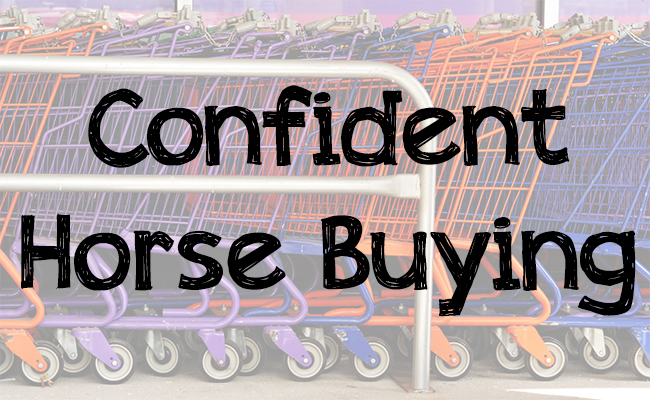Horse Shopping can be very exciting, and very nerve racking at the same time. There are many things to consider before making the commitment to purchase your new equine partner. Here are some tips to make you feel more confident about your purchase decision. If you have any suggestions, be sure to comment below!
- Don’t be color-blind. Yes, it is OK to have a favorite color horse. No, it is not OK to make the horse’s color one of your top criteria (unless you have some major funds when shopping and can afford to turn down the perfect horse in every other way). Think about the usefulness of the horse, your riding level, and what you intend to do with the horse now and into the future. Try out every horse that fits that criteria. You might surprise yourself and fall in love with a completely different color horse. Or you might still end up with the color you were hoping for. But just don’t limit yourself with color as a shopping criteria.
- Don’t shop alone. Shopping is always more fun with a friend anyways, but when making an important decision like this, it’s always great to get another person’s input (especially one that isn’t as emotionally involved). They might come up with questions you haven’t thought of, or catch something you didn’t notice. This doesn’t have to be a trainer, but if you work with a trainer that you trust, it wouldn’t hurt to bring them along (trainers do usually charge for their time though, understandably).
- Ask the hard questions. Make sure to ask the seller if the horse has had any previous injuries, lameness concerns, surgeries, colic issues, etc. While the answers to these questions might not turn you off from the horse, it is important to be armed with as much info as possible when trying to make a decision as large as this!
- Get a Pre-Purchase Exam (PPE). Once you find a horse you are really seriously interested in pursuing, get a vet check. Keep in mind that almost no horse is 100% perfect, but a vet will help you understand the consequences any conformation flaws or previous injuries might present now or into the horse’s future. Get all the information, do research, understand the possibilities and maintenance, and then make your decision. You can even ask your vet if they would buy the horse (knowing what it’s job will be) with whatever problem they come across; this is a good indicator into how serious of a concern the issue might be. A vet check cannot guarantee the lifetime soundness of your potential new partner, but it can help you discover any current issues, conformation flaws, previous injuries and other things going on with the horse. As sad as it sounds, a lot of horse sellers are like used car salesmen and are not completely honest about the horse’s history. Be your own advocate here. You might end up vetting a couple of horses, but in the long run it will save you money by avoiding a bad purchase.
- Be realistic with your current expectations and future goals. If you know you want to do prelim eventing, or FEI dressage, or 1D barrel racing, shop for a horse that can indeed do that. In the long run you will be happier, your future equine partner will be happier and it will be more fair to the both of you.
- Walk away if they have the horse tied, groomed, & tacked for you (come back another time if you are still interested in this horse). A part of horse ownership is getting the horse ready. You want to see how the horse behaves while tacking up, while being groomed, how they stand for picking their feet, etc. Yes behavioral issues during these things can be fixed with some time and patience, but you need to know what you are facing before you decide on such a large purchase. If the horse is just hanging out ready and waiting, is also sometimes a sign that the horse has already been worked and is tired. You want to know exactly how the horse behaves when fresh.
- Have the owner ride the horse first. Back to the used car salesman thing… Make sure you see the horse going safely before you swing your own leg over the back of a potential purchase horse. If the owner isn’t willing to swing a leg over, that is a huge red flag! (Unless the horse is advertised as a dangerous horse and you know what you are getting into).
- If you have any doubts, ask for a trial. Ask the seller if they are willing to do a 1-2 week trial period. This would consist of you bringing the horse to your place, testing the horse out for the pre-determined amount of time, and seeing if they really would fit into your life well. Not all sellers will be comfortable with this, and that’s ok. It is asking them to trust a stranger with their horse. Something to keep in mind with a trial, is many sellers will require you to get insurance on the horse while it is in your care in case something were to happen.
Buying a horse is a huge investment in your time and money. Even though it is a very personal decision, you need to try to keep an open mind and be honest with yourself about any potential horse purchase. Happy shopping!






Leave a Reply
You must be logged in to post a comment.